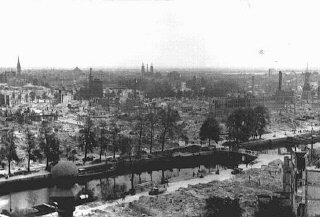|
|

|

|
View of Rotterdam after German bombing in May 1940. Rotterdam, the Netherlands, 1940. See more photographs |
GERMAN INVASION OF WESTERN EUROPE, MAY 1940 |
||||
|
|
The campaign against the Low Countries and France lasted less than six weeks. Germany attacked in the west on May 10, 1940. Initially, British and French commanders had believed that German forces would attack through central Belgium as they had in World War I, and rushed forces to the Franco-Belgian border to meet the German attack. The main German attack however, went through the Ardennes Forest in southeastern Belgium and northern Luxembourg. German tanks and infantry quickly broke through the French defensive lines and advanced to the coast. Belgium and the Netherlands surrendered in May. More than 300,000 French and British troops were evacuated from the beaches near Dunkirk (Dunkerque) across the English Channel to Great Britain. Paris, the French capital, fell to the Germans on June 14, 1940. |
As part of the armistice agreement France signed with Germany on June 22, Germany occupied northern France and all of France's Atlantic coastline down to the border with Spain. A new French government was established in the town of Vichy, which was in the unoccupied southern part of France. The Vichy government, under Marshall Henri Petain, declared neutrality in the war between Germany and Great Britain, but was committed by the armistice provisions to cooperation with Germany. The Germans viewed the defeat of Britain's Royal Air Force (RAF) as a prerequisite for an invasion of the British Isles. When the German air force failed to win air superiority over southeastern England in 1940, Hitler postponed the invasion until the spring of 1941. After the first operational order for the German invasion of the Soviet Union was issued in December 1940, the German invasion of Great Britain was postponed indefinitely. |
|
|
|
|